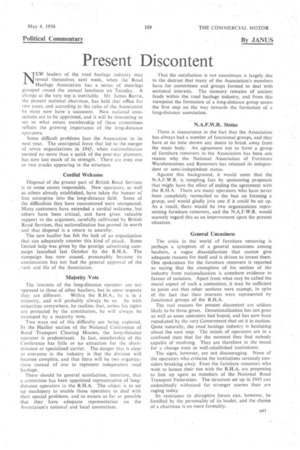Present Discontent
Page 77

If you've noticed an error in this article please click here to report it so we can fix it.
EW leaders of the road haulage industry may
is q
reveal themselves next week, when the Road Haulage Association has a series of meetings grouped round the annual luncheon on Tuesday. A change at the very top is inevitable. Mr. James Barrie, the present national chairman, has held that office for two years, and according to the rules of the Association he must now have a successor. New national committees are to be appointed, and it will be interesting to see to what extent membership of these committees reflects the growing importance of the long-distance operators.
Some difficult problems face the Association in its next year. The centripetal force that led to the merger of seven organizations in 1945, when nationalization seemed no more than a 'quirk of the post-war planners, has now lost much of its strength. There are even one or two cracks appearing in the structure.
Cordial Welcome
Disposal of the greater part of British Road Services is to some extent responsible. New operators, as well as others already established, have taken the banner of free enterprise into the long-distance field. Some of the difficulties they have encountered were unexpected. Many customers have extended a cordial welcome, but others have been critical, and have given valuable support to the argument, carefully cultivated by British Road Services, that nationalization has proved its worth and that disposal is a return to anarchy.
The new haulier has felt the lack of an organization that can adequately counter this kind of attack. Some limited help was given by the prestige advertising campaign launched last October by the R.H.A. The campaign has now ceased, presumably because its continuation has not had the general approval of the rank and file of the Association.
Majority Vote
The interests of the long-distance operator are not opposed to those of other hauliers, but in some respects they are different. Within the R.H.A., he is in a minority, and will probably always be so. As with minorities everywhere, he realizes that, unless his rights are protected by the constitution, he will always be swamped by a majority vote.
Two ways out of this difficulty are being explored. In the Haulier section of the National Conference of Road Transport Clearing Houses, the long-distance operator is predominant. In fact, membership of the Conference has little or no .attraction for the shortdistance or specialized carrier. The danger that is clear to everyone in the industry is that the division will become complete, and that there will be two organizations instead of one to represent independent road haulage.
There should be general satisfaction, therefore, that a committee has been appointed representative of longdistance operators in the R.H.A. The object is to set up machinery to enable those operators to deal with their special problems, and to ensure as far as possible that they have adequate representation on the Association's national and local committees. That the satisfaction is not unanimous is largely due to the distrust that many of the Association's members have for committees and groups formed to deal with sectional interests. The memory remains of ancient feuds within the road haulage industry, and from this viewpoint the formation of a long-distance group seems the first step on the way towards the formation of a long-distance association.
N.A.F.W.R. Status
There is reassurance in the fact that the Association has always had a number of functional groups, and they have at no time shown any desire to break away from the main body. An agreement not to form a group of furniture removers in the Association has been one reason why the National Association of Furniture Warehousemen and Removers has retained its indepen dent or semi-independent status; • Against this background, it would seem that the N.A.F.W.R. is tempting fate by sponsoring proposals that might have the effect of ending the agreement with the R.H.A. There are many operators Who have never been completely reconciled to theban on forming a group, and would gladly join one if it could be set U. Asa result, there would be two organizations representing furniture removers, and the N.A.F.W.R. would scarcely regard this as an improvement upon the present situation.
General Uneasiness
The crisis in the world of furniture removing is perhaps a symptom of a general uneasiness among hauliers, a vague dissatisfaction that cannot give adequate reasons for itself and is driven to invent them. One spokesman for the furniture removers is reported as saying that the exemption of his section of the industry from nationalization is somehow evidence in favour of isolation. Apart from what may be called the moral aspect of such a contention, it may be sufficient to point out that other sections were exempt, in spite of the fact that their interests were represented by functional groups of the R.H.A.
The real reasons for present discontent are seldom likely to be those given_ Denationalization has not gone as well as some operators had hoped, and has now been repudiated by the very Government that set it in motion. Quite naturally, the road haulage industry is hesitating about the next step. The minds of operators are in a confused state that for the moment they find nobody capable of resolving. They are therefore in the mood for a change even in well-established institutions.
, The signs, however, are not discouraging. None of the operators who criticize the institutions seriously considers breaking aveiy. Even the furniture removers who wish to loosen their ties with the R.H.A. are proposing to link up again as members of the National Road Transport Federation. The structure set up in 1945 can undoubtedly withstand far stronger storms than are raging today. : Its resistance to disruptive, forces can, however, be fortified by the personality of its leader, and the choice of a chairman is no mere formality.




































































































































